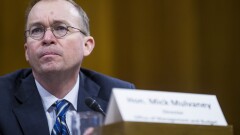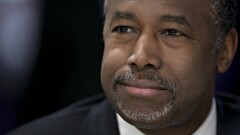Readers react to a new housing finance reform plan, weigh systemic risks posed by fintechs, debate the potential return of the Glass-Steagall Act and more.

"Updating fintech regulations is a necessity recognized by lawmakers, yet this necessity has not been implemented. This article defines the problem and gives the solution. Is anyone listening?"
Related:

"This failure of oversight has been going on for years. The main card processing companies are independent and unregulated. They are the quintessential SIFI yet the Financial Stability council ignores them. If one of them goes down transactions would be massively disrupted nationally. A prudent level of regulation could start there with oversight of their financial condition, technology and developing contingent receivership plans."
Related:

"Along with all the well-laid out risks in this article is another scary prospect; loosely regulated fintech companies gaining access to the bank payments system. Despite rigorous operational controls, robust regulatory supervision and comprehensive audit oversight, cybersecurity is a constant and existential threat to the banking system. The possibility of a fintech with less stringent controls providing a port of entry for hackers to the broader payments system is a real nightmare."
Related:

"Along with all the well-laid out risks in this article is another scary prospect; loosely regulated fintech companies gaining access to the bank payments system. Despite rigorous operational controls, robust regulatory supervision and comprehensive audit oversight, cybersecurity is a constant and existential threat to the banking system. The possibility of a fintech with less stringent controls providing a port of entry for hackers to the broader payments system is a real nightmare."
Related:

"If (and it is a big If) the Dem's regain control of the House, they will be too busy focusing on impeachment and otherwise grandstanding to pay much attention to something as complex as Glass-Steagall. Plus, there is the matter of the Senate and Presidential Pen, which will likely stymie most anything coming out of a Democrat House. Repeal of GS is a long shot at best."
Related:

"What an ineffective joke."
Related:

"Ginnie Mae will not be the solution to the nation's housing market reform as long as the Housing Secretary or FHA's commissioner can set mortgage insurance premium rates through politics instead of math. We saw that with Shaun Donovan and Julian Castro but it remains to be seen at the next crisis whether Ben Carson will rule by partisan politics or actuarial science."
Related:

"Before you shut them down, first try and see what happens when you instruct the Federal Reserve to stop buying and reinvesting in virtually all their product. This proposal is uninformed on market forces."
Related:

"This is an idea which sounds good but the devil is in the details. My suspicion is that many potential small, short-term loan customers have credit and/or negative account histories which make them historically non-bankable. Banks will be forced to loosen standards, adding risk. Loans will likely be unprofitable at any acceptable rate because of the small size, operational costs and credit risk. If credit qualified, an existing product (a credit card) will solve the problem."
Related:

"Subscription? It's also know as a 'monthly maintenance fee,' and it's been around for decades."
Related:





